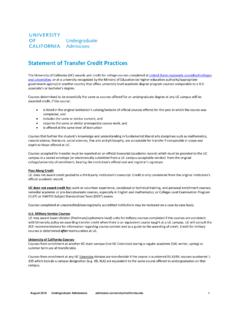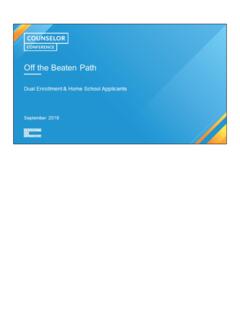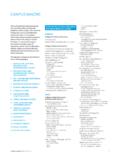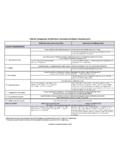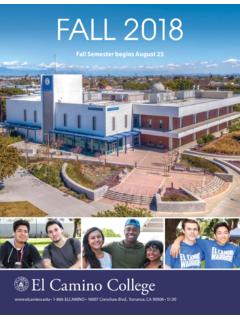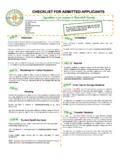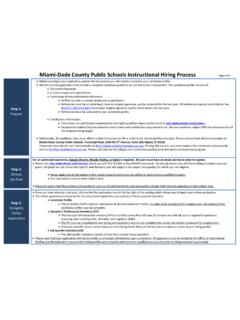Transcription of Thank you for taking time to learn about the UC admission ...
1 Thank you for taking time to learn about the UC admission application and review helpful tips so that applicants can best present themselves. This presentation is for students applying for freshman admission . 1. 2. Before you begin, it's important to understand the application process, and what should be done to prepare to complete the application. 3. Fall admission Application: Opens August 1. For other terms (winter/spring) go to: Application Submission: between November 1 and 30. Applicants must meet the deadline; late applications are rarely accepted. December Test Scores: For ACT with Writing and/or the SAT with Essay tests (or SAT Subject Tests).
2 Exams completed in December, applicants must first self-report the test results by logging back into their submitted application as soon as scores are received. Official December test scores must be sent to one UC campus as soon as the scores are available; scores will be shared with all campuses to which the student applied. admission Decisions: Campuses may begin to admit students as early as February 1, but most students will receive notification of admission via the campus' applicant portal during the month of March. Waitlist Offers: Some students may receive an offer to be placed on a waitlist at one or more campuses.
3 If a waitlist offer is extended, applicants must respond by the stated deadline. UC campuses very rarely make exceptions for a late response. Guarantee of admission : In mid-April, applicants who were identified as being in the Top 9%. Statewide or Top 9% Local Context (ELC) and met/will meet all admission requirements, but were not offered admission to any campus at which they applied, will be sent an email message if another campus has space available to offer them a place. Statement of Intent to Register: May 1 is the deadline to submit the Statement of Intent to Register (SIR) (accept an offer of admission ) to ONLY ONE UC campus for all freshman admits who received an offer by April 1.
4 Admit offers received after April 1 will include a corresponding SIR deadline. Waitlist Decisions: Early May to early July, campuses will notify applicants who accepted a place on the waitlist of the final decision on their application. 4. For students : Begin preparing for the application now don't wait until November. Start by researching the campuses now so you know where you want to apply. learn about the majors offered and all the types of courses needed to earn the UC degree so you are fully informed about graduation requirements and can plan how long it may take to graduate. If you are certain about the intended major, review the curriculum in the campus' General Catalog List of majors by disciplines across all nine UC campuses: Some majors are not open to freshmen applicants, or for every term.
5 Gather materials that you'll need: transcripts/academic records, list of current and planned courses, test scores, awards and honors, volunteer program timelines and hours, employment timeline and hours, etc. Brainstorm: take time to remember all the important things you have done throughout secondary/high school, from club involvement, to volunteering, to athletics and leadership, and more. Your short answer responses to the personal insight questions are important. Write responses early and refer to online resources with writing tips and a worksheet (a video is also available) to help you get started. Ask a trusted teacher, counselor, or other adult for feedback on each of your responses.
6 All UC campuses are selective. Apply to different types of campuses throughout the system for your best chance of being admitted and finding a good match. Information on each UC campus can be found at: Campuses use email to communicate with applicants during the application process; students should create an email account (preferably one that identifies them instead of a cute or non-distinct name). and be sure to check it regularly. 5. Applicants to UC should understand how their application information will be reviewed by the campuses. This section offers guidance on the importance of the information presented and how campuses will use the information to understand the context of the applicant's educational experience.
7 6. Requirements: All UC campuses have the same minimum requirements for freshmen to ensure that all students are prepared to be academically successful at the University. Selection: Selection is a process at each campus which is necessary when more applicants apply to a campus than a campus can admit and enroll. Each UC campus evaluates applicants beyond just their GPA and test scores in order to select the applicants who are best suited for their campus. Applicant Pool: Who else is in the applicant pool? Applicants must remember that they are not just applying with students from their school and community, but also with students from all parts of California, the and from other countries, whose backgrounds may be similar or different from their own.
8 UC receives applications from students with a variety of attributes: those living in small rural areas, students from families with low and high incomes and communities that have high and low college-going rates, out-of-state students , etc. Even if students think their background or situation is typical (or not unusual) it's important to explain (not complain) why, so UC admission staff understand the applicant better. The admission staff need more than just a school name or city to get a better sense of the applicant. Each UC campus evaluates the application without knowing the status of the same application at another campus.
9 One campus will not admit or deny based on the admission decision of another campus. 7. Each UC campus has a unique application review process developed by its faculty committee. Each campus may place a different emphasis or value on the information in the application in the Comprehensive Review process. ALL campuses conduct a Comprehensive Review. In general campuses look for: Strong grades & examination scores, courses beyond the minimum requirements, and in some cases, specific course preparation like advanced math and additional science for STEM majors Involvement & leadership Well-rounded doesn't mean a student has to do everything, but we like to see evidence of students being involved outside of the classroom in activities they are passionate about an inclusive educational experience Each applicant is reviewed within the context of his or her available opportunities.
10 If a student does well compared to peers within the same situation (school, environment, etc.) and uses the application to explain that context, the applicant will provide UC readers with a better understanding of how they were able to achieve/complete what is presented on the application. Each campus may differ on the relative weight (if any) accorded to any criterion students should visit each campus' website for the specific selection process UC looks for students who have challenged themselves in many ways: students are most successful at our campuses if they have shown academic promise through their courses/grades, test scores and other academic pursuits.



